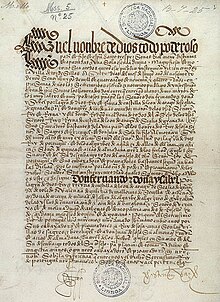
Back Verdrag van Tordesillas AF معاهدة توردسيلاس Arabic Tratáu de Tordesillas AST Tordesiyas müqaviləsi AZ Тордесильяс килешеүе BA Тардэсільяскі дагавор BE Договор от Тордесиляс Bulgarian Tractat de Tordesillas Catalan Tordesillaská smlouva Czech Cytundeb Tordesillas CY
| Treaty of Tordesillas | |
|---|---|
 Front page of the Portuguese-owned treaty. This page is written in Spanish. | |
| Created | 7 June 1494 in Tordesillas, Spain |
| Ratified | 2 July 1494 in Spain 5 September 1494 in Portugal 24 January 1505 or 1506 by Pope Julius II[1][2] |
| Signatories | Ferdinand II of Aragon Isabella I of Castile John, Prince of Asturias John II of Portugal[3][4] |
| Purpose | To resolve the conflict that arose from the 1481 papal bull Aeterni regis which affirmed Portuguese claims to all non-Christian lands south of the Canary Islands after Columbus claimed the Antilles for Castile, and to divide trading and colonising rights for all lands located west of the Canary Islands between Portugal and Castile (later applied between the Spanish Crown and Portugal) to the exclusion of any other Christian empires. |
The Treaty of Tordesillas,[a] signed in Tordesillas, Spain, on 7 June 1494, and ratified in Setúbal, Portugal, divided the newly discovered lands outside Europe between the Kingdom of Portugal and the Crown of Castile, along a meridian 370 miles west of the Cape Verde islands, off the west coast of Africa. That line of demarcation was about halfway between Cape Verde (already Portuguese) and the islands visited by Christopher Columbus on his first voyage (claimed for Castile and León), named in the treaty as Cipangu and Antillia (Cuba and Hispaniola).
The lands to the east would belong to Portugal and the lands to the west to Castile, modifying an earlier bull by Pope Alexander VI. The treaty was signed by Spain on 2 July 1494, and by Portugal on 5 September 1494. The other side of the world was divided a few decades later by the Treaty of Zaragoza, signed on 22 April 1529, which specified the antimeridian to the line of demarcation specified in the Treaty of Tordesillas. Portugal and Spain largely respected the treaties, while the indigenous peoples of the Americas did not acknowledge them.[5]
The treaty was included by UNESCO in 2007 in its Memory of the World Programme. Originals of both treaties are kept at the General Archive of the Indies in Spain and at the Torre do Tombo National Archive in Portugal.[6]
- ^ Horst Pietschmann, Atlantic history : history of the Atlantic System 1580–1830, Göttingen : Vandenhoeck & Ruprecht, 2002, p. 239
- ^ Parise, Agustín (2017). Ownership Paradigms in American Civil Law Jurisdictions: Manifestations of the Shifts in the Legislation of Louisiana, Chile, and Argentina (16th–20th Centuries). Brill. p. 68. ISBN 978-9004338203. Retrieved 21 September 2018.
- ^ Blair & Robertson (1903).
- ^ Davenport (1917), p. 100.
- ^ Miller, Robert; LeSage, Lisa; Escarcena, Sebastián (1 August 2011). "The International Law of Discovery, Indigenous Peoples, and Chile". Nebraska Law Review. 89 (4): 829.
- ^ Davenport (1917), pp. 85 & 171.
Cite error: There are <ref group=lower-alpha> tags or {{efn}} templates on this page, but the references will not show without a {{reflist|group=lower-alpha}} template or {{notelist}} template (see the help page).